Leadership: Theories and Qualities of Effective Leadership
VerifiedAdded on 2023/01/23
|17
|4517
|24
AI Summary
This research paper examines the theories and qualities of effective leadership. It explores different theories of leadership and discusses the importance of qualities such as honesty, effective communication, inspiration, and commitment in leadership. The paper also highlights the impact of leadership on organizational success.
Contribute Materials
Your contribution can guide someone’s learning journey. Share your
documents today.
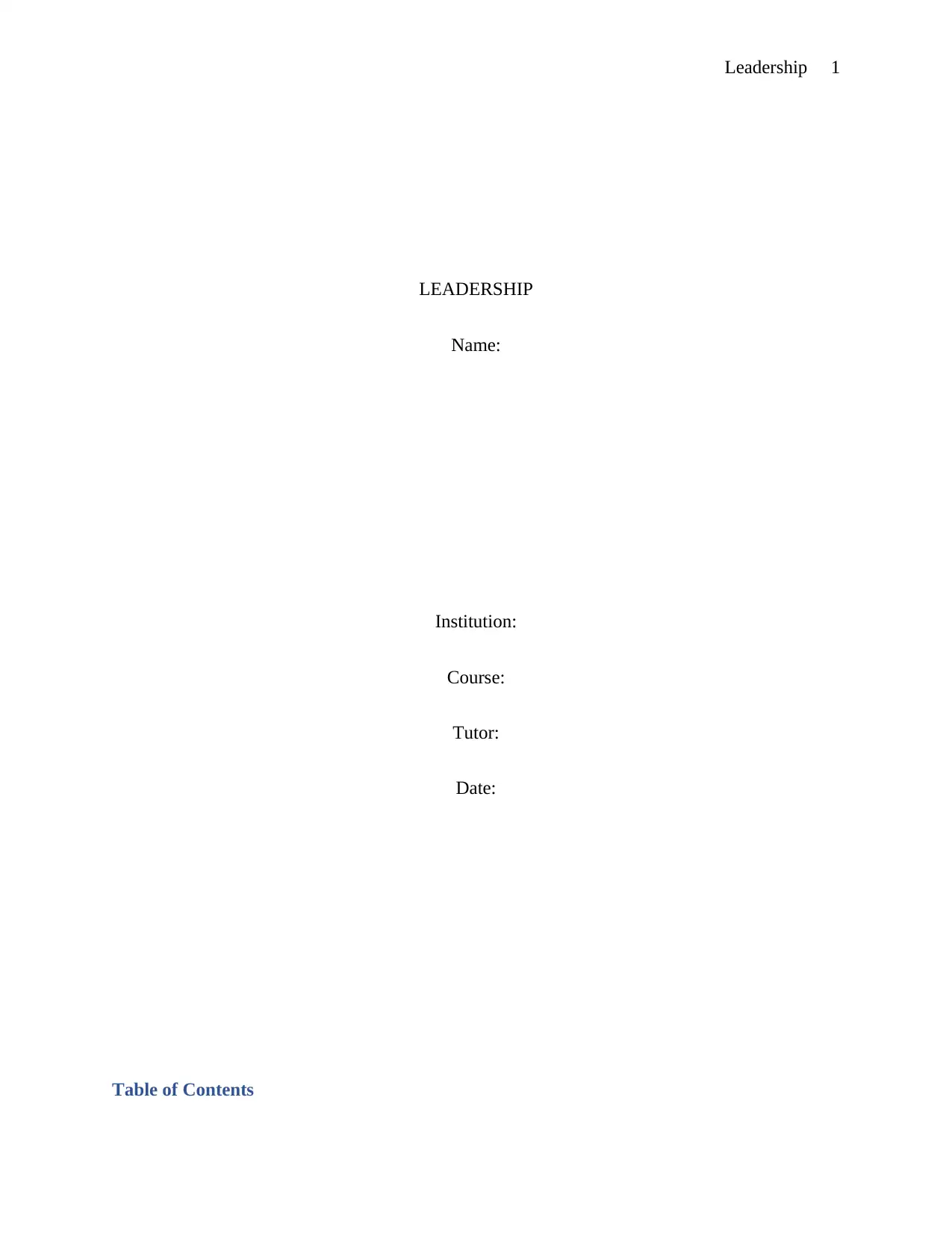
Leadership 1
LEADERSHIP
Name:
Institution:
Course:
Tutor:
Date:
Table of Contents
LEADERSHIP
Name:
Institution:
Course:
Tutor:
Date:
Table of Contents
Secure Best Marks with AI Grader
Need help grading? Try our AI Grader for instant feedback on your assignments.
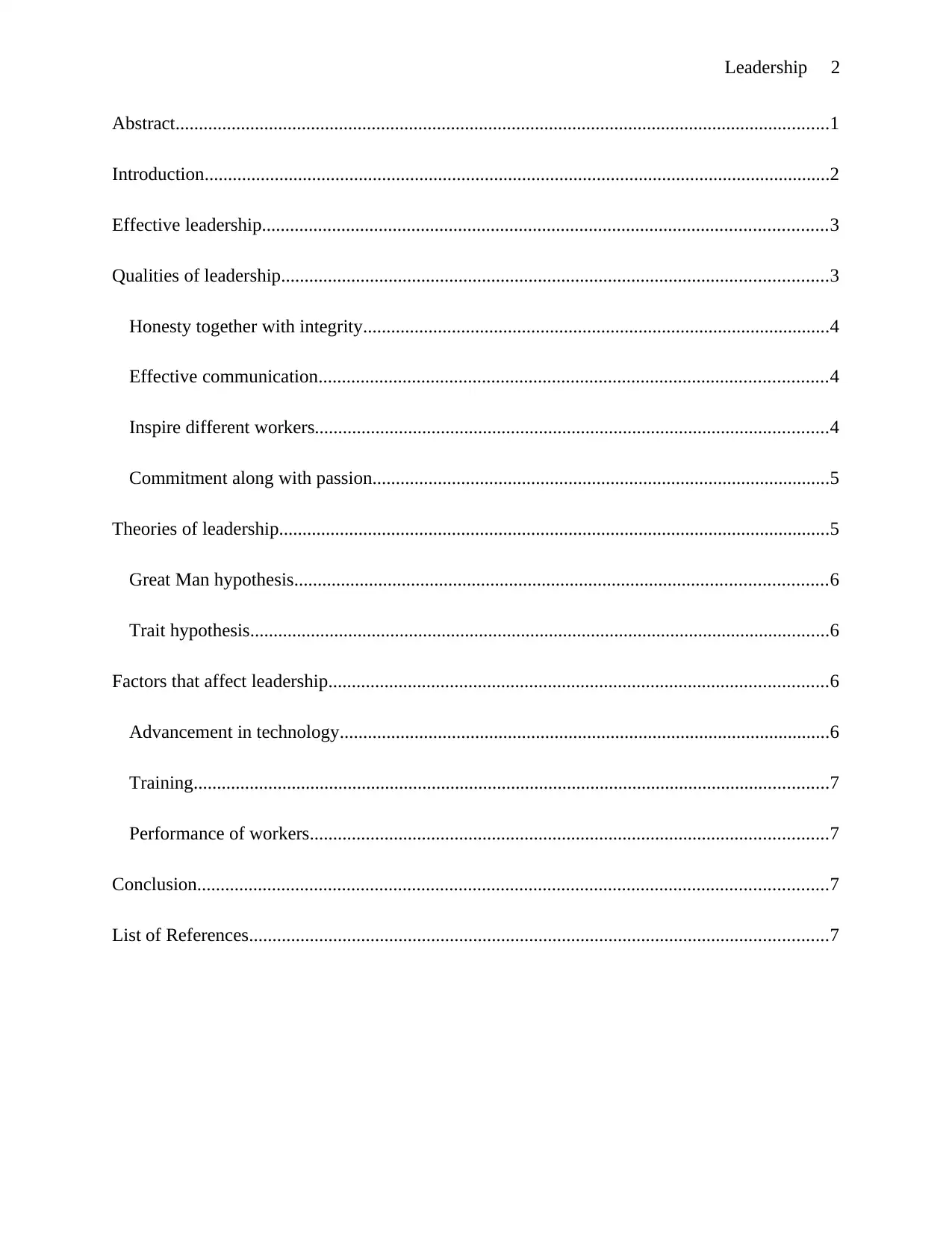
Leadership 2
Abstract............................................................................................................................................1
Introduction......................................................................................................................................2
Effective leadership.........................................................................................................................3
Qualities of leadership.....................................................................................................................3
Honesty together with integrity....................................................................................................4
Effective communication.............................................................................................................4
Inspire different workers..............................................................................................................4
Commitment along with passion..................................................................................................5
Theories of leadership......................................................................................................................5
Great Man hypothesis..................................................................................................................6
Trait hypothesis............................................................................................................................6
Factors that affect leadership...........................................................................................................6
Advancement in technology.........................................................................................................6
Training........................................................................................................................................7
Performance of workers...............................................................................................................7
Conclusion.......................................................................................................................................7
List of References............................................................................................................................7
Abstract............................................................................................................................................1
Introduction......................................................................................................................................2
Effective leadership.........................................................................................................................3
Qualities of leadership.....................................................................................................................3
Honesty together with integrity....................................................................................................4
Effective communication.............................................................................................................4
Inspire different workers..............................................................................................................4
Commitment along with passion..................................................................................................5
Theories of leadership......................................................................................................................5
Great Man hypothesis..................................................................................................................6
Trait hypothesis............................................................................................................................6
Factors that affect leadership...........................................................................................................6
Advancement in technology.........................................................................................................6
Training........................................................................................................................................7
Performance of workers...............................................................................................................7
Conclusion.......................................................................................................................................7
List of References............................................................................................................................7
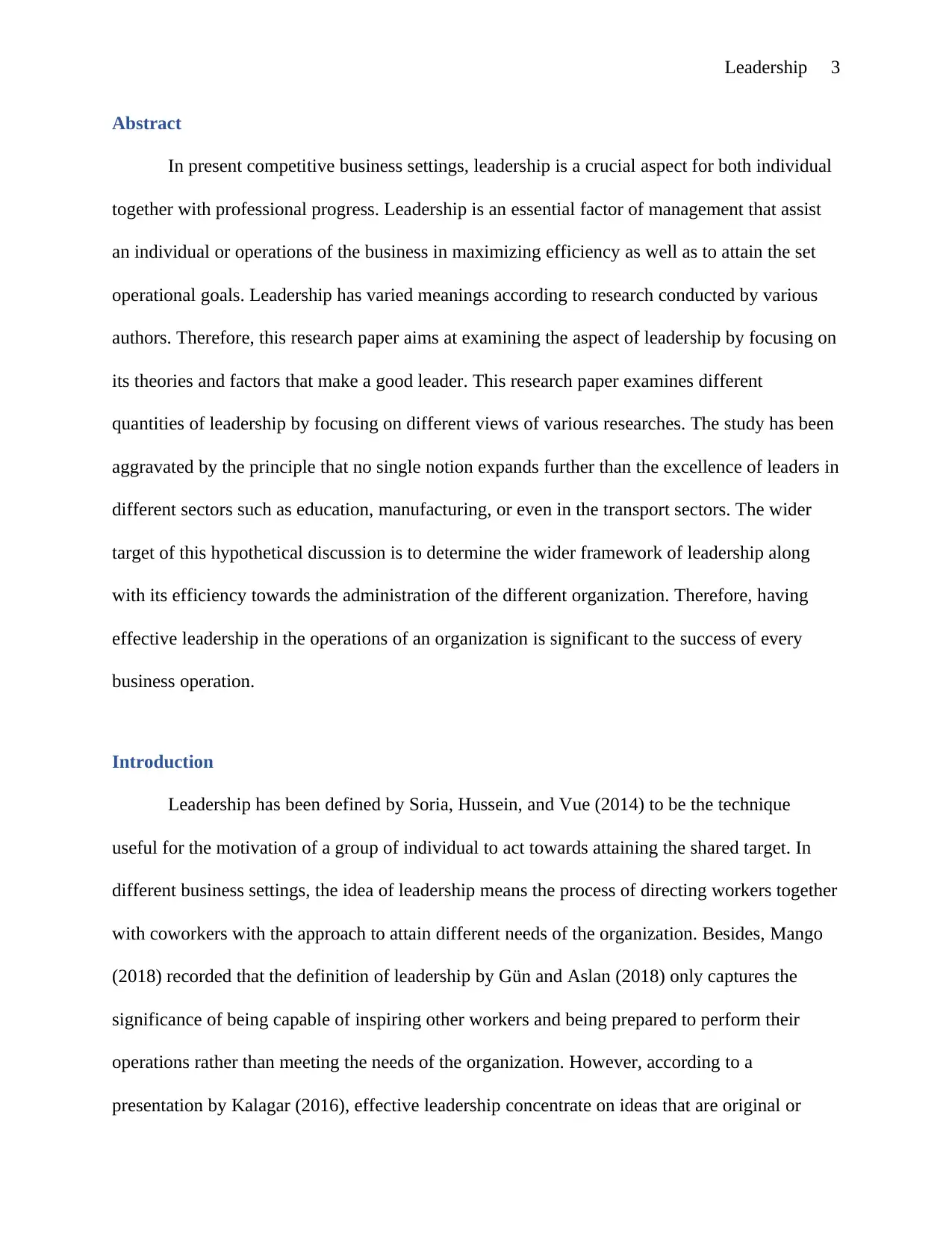
Leadership 3
Abstract
In present competitive business settings, leadership is a crucial aspect for both individual
together with professional progress. Leadership is an essential factor of management that assist
an individual or operations of the business in maximizing efficiency as well as to attain the set
operational goals. Leadership has varied meanings according to research conducted by various
authors. Therefore, this research paper aims at examining the aspect of leadership by focusing on
its theories and factors that make a good leader. This research paper examines different
quantities of leadership by focusing on different views of various researches. The study has been
aggravated by the principle that no single notion expands further than the excellence of leaders in
different sectors such as education, manufacturing, or even in the transport sectors. The wider
target of this hypothetical discussion is to determine the wider framework of leadership along
with its efficiency towards the administration of the different organization. Therefore, having
effective leadership in the operations of an organization is significant to the success of every
business operation.
Introduction
Leadership has been defined by Soria, Hussein, and Vue (2014) to be the technique
useful for the motivation of a group of individual to act towards attaining the shared target. In
different business settings, the idea of leadership means the process of directing workers together
with coworkers with the approach to attain different needs of the organization. Besides, Mango
(2018) recorded that the definition of leadership by Gün and Aslan (2018) only captures the
significance of being capable of inspiring other workers and being prepared to perform their
operations rather than meeting the needs of the organization. However, according to a
presentation by Kalagar (2016), effective leadership concentrate on ideas that are original or
Abstract
In present competitive business settings, leadership is a crucial aspect for both individual
together with professional progress. Leadership is an essential factor of management that assist
an individual or operations of the business in maximizing efficiency as well as to attain the set
operational goals. Leadership has varied meanings according to research conducted by various
authors. Therefore, this research paper aims at examining the aspect of leadership by focusing on
its theories and factors that make a good leader. This research paper examines different
quantities of leadership by focusing on different views of various researches. The study has been
aggravated by the principle that no single notion expands further than the excellence of leaders in
different sectors such as education, manufacturing, or even in the transport sectors. The wider
target of this hypothetical discussion is to determine the wider framework of leadership along
with its efficiency towards the administration of the different organization. Therefore, having
effective leadership in the operations of an organization is significant to the success of every
business operation.
Introduction
Leadership has been defined by Soria, Hussein, and Vue (2014) to be the technique
useful for the motivation of a group of individual to act towards attaining the shared target. In
different business settings, the idea of leadership means the process of directing workers together
with coworkers with the approach to attain different needs of the organization. Besides, Mango
(2018) recorded that the definition of leadership by Gün and Aslan (2018) only captures the
significance of being capable of inspiring other workers and being prepared to perform their
operations rather than meeting the needs of the organization. However, according to a
presentation by Kalagar (2016), effective leadership concentrate on ideas that are original or
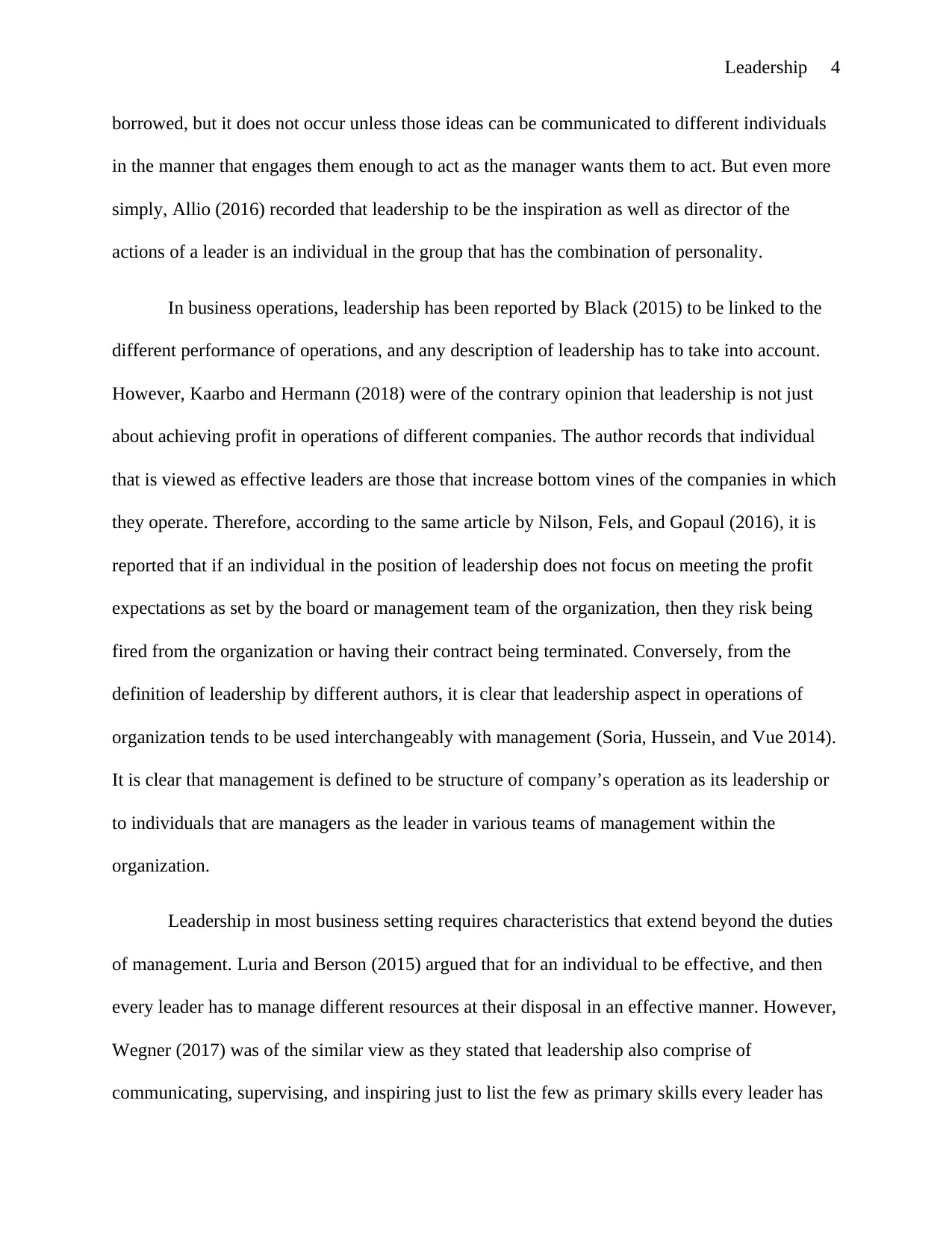
Leadership 4
borrowed, but it does not occur unless those ideas can be communicated to different individuals
in the manner that engages them enough to act as the manager wants them to act. But even more
simply, Allio (2016) recorded that leadership to be the inspiration as well as director of the
actions of a leader is an individual in the group that has the combination of personality.
In business operations, leadership has been reported by Black (2015) to be linked to the
different performance of operations, and any description of leadership has to take into account.
However, Kaarbo and Hermann (2018) were of the contrary opinion that leadership is not just
about achieving profit in operations of different companies. The author records that individual
that is viewed as effective leaders are those that increase bottom vines of the companies in which
they operate. Therefore, according to the same article by Nilson, Fels, and Gopaul (2016), it is
reported that if an individual in the position of leadership does not focus on meeting the profit
expectations as set by the board or management team of the organization, then they risk being
fired from the organization or having their contract being terminated. Conversely, from the
definition of leadership by different authors, it is clear that leadership aspect in operations of
organization tends to be used interchangeably with management (Soria, Hussein, and Vue 2014).
It is clear that management is defined to be structure of company’s operation as its leadership or
to individuals that are managers as the leader in various teams of management within the
organization.
Leadership in most business setting requires characteristics that extend beyond the duties
of management. Luria and Berson (2015) argued that for an individual to be effective, and then
every leader has to manage different resources at their disposal in an effective manner. However,
Wegner (2017) was of the similar view as they stated that leadership also comprise of
communicating, supervising, and inspiring just to list the few as primary skills every leader has
borrowed, but it does not occur unless those ideas can be communicated to different individuals
in the manner that engages them enough to act as the manager wants them to act. But even more
simply, Allio (2016) recorded that leadership to be the inspiration as well as director of the
actions of a leader is an individual in the group that has the combination of personality.
In business operations, leadership has been reported by Black (2015) to be linked to the
different performance of operations, and any description of leadership has to take into account.
However, Kaarbo and Hermann (2018) were of the contrary opinion that leadership is not just
about achieving profit in operations of different companies. The author records that individual
that is viewed as effective leaders are those that increase bottom vines of the companies in which
they operate. Therefore, according to the same article by Nilson, Fels, and Gopaul (2016), it is
reported that if an individual in the position of leadership does not focus on meeting the profit
expectations as set by the board or management team of the organization, then they risk being
fired from the organization or having their contract being terminated. Conversely, from the
definition of leadership by different authors, it is clear that leadership aspect in operations of
organization tends to be used interchangeably with management (Soria, Hussein, and Vue 2014).
It is clear that management is defined to be structure of company’s operation as its leadership or
to individuals that are managers as the leader in various teams of management within the
organization.
Leadership in most business setting requires characteristics that extend beyond the duties
of management. Luria and Berson (2015) argued that for an individual to be effective, and then
every leader has to manage different resources at their disposal in an effective manner. However,
Wegner (2017) was of the similar view as they stated that leadership also comprise of
communicating, supervising, and inspiring just to list the few as primary skills every leader has
Secure Best Marks with AI Grader
Need help grading? Try our AI Grader for instant feedback on your assignments.
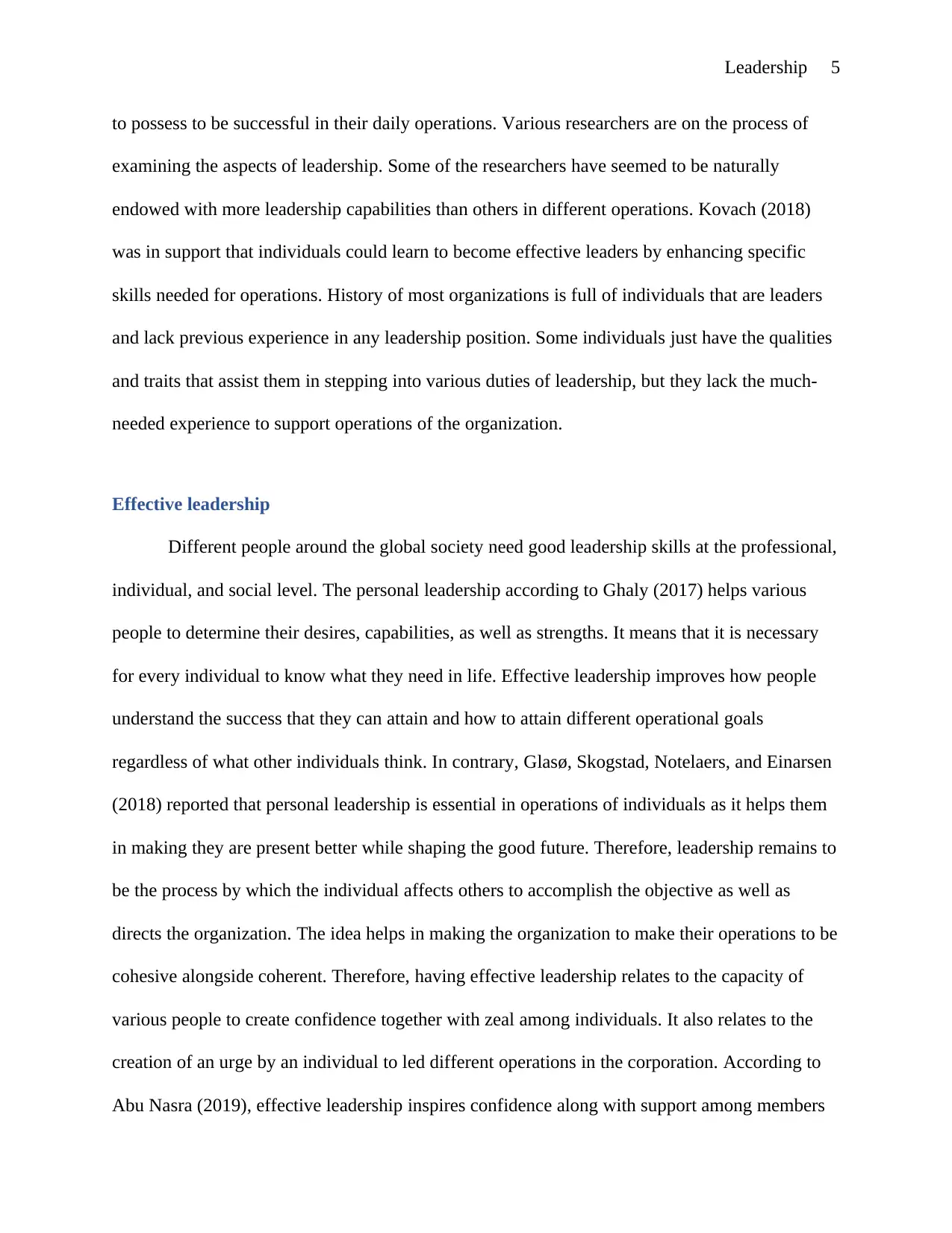
Leadership 5
to possess to be successful in their daily operations. Various researchers are on the process of
examining the aspects of leadership. Some of the researchers have seemed to be naturally
endowed with more leadership capabilities than others in different operations. Kovach (2018)
was in support that individuals could learn to become effective leaders by enhancing specific
skills needed for operations. History of most organizations is full of individuals that are leaders
and lack previous experience in any leadership position. Some individuals just have the qualities
and traits that assist them in stepping into various duties of leadership, but they lack the much-
needed experience to support operations of the organization.
Effective leadership
Different people around the global society need good leadership skills at the professional,
individual, and social level. The personal leadership according to Ghaly (2017) helps various
people to determine their desires, capabilities, as well as strengths. It means that it is necessary
for every individual to know what they need in life. Effective leadership improves how people
understand the success that they can attain and how to attain different operational goals
regardless of what other individuals think. In contrary, Glasø, Skogstad, Notelaers, and Einarsen
(2018) reported that personal leadership is essential in operations of individuals as it helps them
in making they are present better while shaping the good future. Therefore, leadership remains to
be the process by which the individual affects others to accomplish the objective as well as
directs the organization. The idea helps in making the organization to make their operations to be
cohesive alongside coherent. Therefore, having effective leadership relates to the capacity of
various people to create confidence together with zeal among individuals. It also relates to the
creation of an urge by an individual to led different operations in the corporation. According to
Abu Nasra (2019), effective leadership inspires confidence along with support among members
to possess to be successful in their daily operations. Various researchers are on the process of
examining the aspects of leadership. Some of the researchers have seemed to be naturally
endowed with more leadership capabilities than others in different operations. Kovach (2018)
was in support that individuals could learn to become effective leaders by enhancing specific
skills needed for operations. History of most organizations is full of individuals that are leaders
and lack previous experience in any leadership position. Some individuals just have the qualities
and traits that assist them in stepping into various duties of leadership, but they lack the much-
needed experience to support operations of the organization.
Effective leadership
Different people around the global society need good leadership skills at the professional,
individual, and social level. The personal leadership according to Ghaly (2017) helps various
people to determine their desires, capabilities, as well as strengths. It means that it is necessary
for every individual to know what they need in life. Effective leadership improves how people
understand the success that they can attain and how to attain different operational goals
regardless of what other individuals think. In contrary, Glasø, Skogstad, Notelaers, and Einarsen
(2018) reported that personal leadership is essential in operations of individuals as it helps them
in making they are present better while shaping the good future. Therefore, leadership remains to
be the process by which the individual affects others to accomplish the objective as well as
directs the organization. The idea helps in making the organization to make their operations to be
cohesive alongside coherent. Therefore, having effective leadership relates to the capacity of
various people to create confidence together with zeal among individuals. It also relates to the
creation of an urge by an individual to led different operations in the corporation. According to
Abu Nasra (2019), effective leadership inspires confidence along with support among members
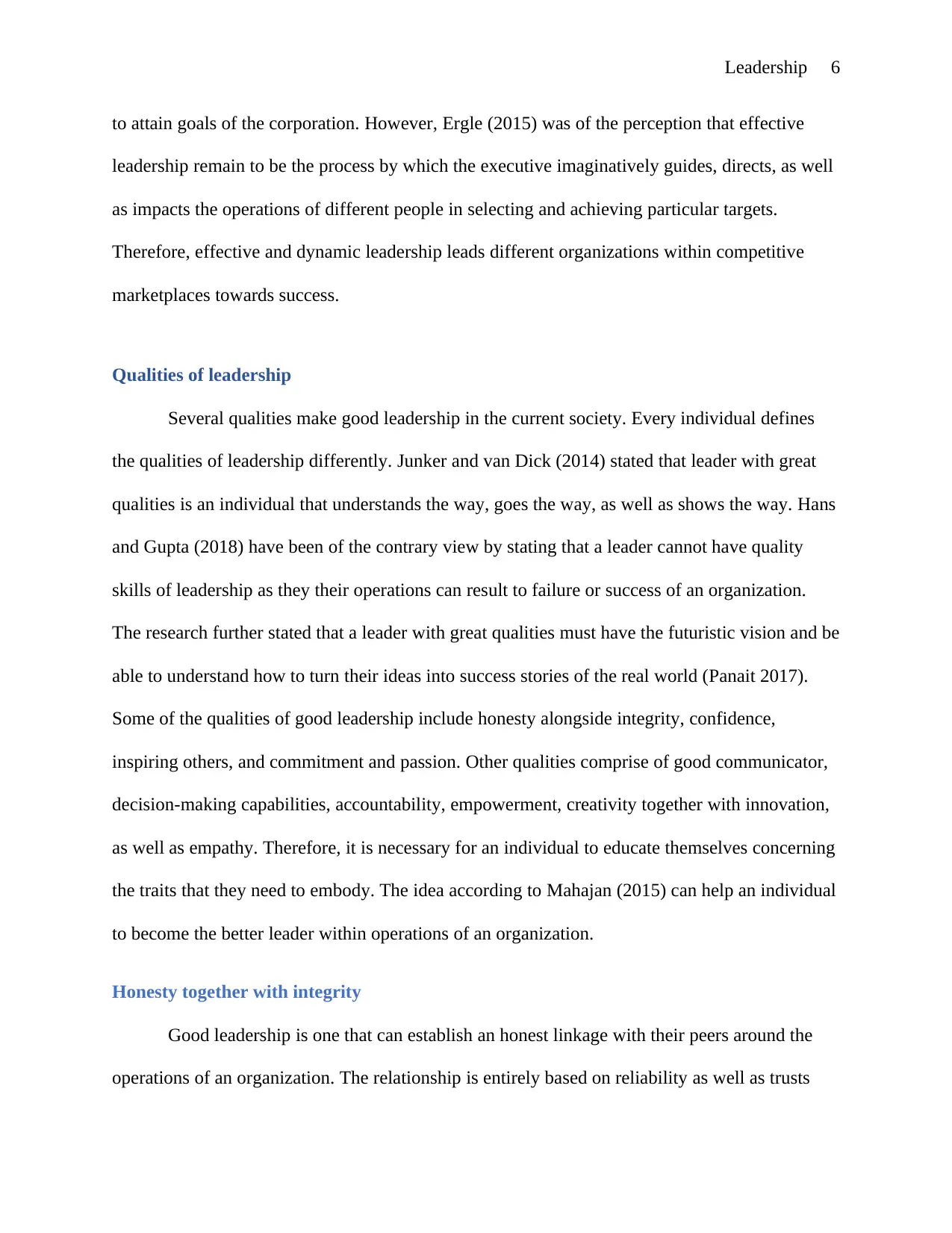
Leadership 6
to attain goals of the corporation. However, Ergle (2015) was of the perception that effective
leadership remain to be the process by which the executive imaginatively guides, directs, as well
as impacts the operations of different people in selecting and achieving particular targets.
Therefore, effective and dynamic leadership leads different organizations within competitive
marketplaces towards success.
Qualities of leadership
Several qualities make good leadership in the current society. Every individual defines
the qualities of leadership differently. Junker and van Dick (2014) stated that leader with great
qualities is an individual that understands the way, goes the way, as well as shows the way. Hans
and Gupta (2018) have been of the contrary view by stating that a leader cannot have quality
skills of leadership as they their operations can result to failure or success of an organization.
The research further stated that a leader with great qualities must have the futuristic vision and be
able to understand how to turn their ideas into success stories of the real world (Panait 2017).
Some of the qualities of good leadership include honesty alongside integrity, confidence,
inspiring others, and commitment and passion. Other qualities comprise of good communicator,
decision-making capabilities, accountability, empowerment, creativity together with innovation,
as well as empathy. Therefore, it is necessary for an individual to educate themselves concerning
the traits that they need to embody. The idea according to Mahajan (2015) can help an individual
to become the better leader within operations of an organization.
Honesty together with integrity
Good leadership is one that can establish an honest linkage with their peers around the
operations of an organization. The relationship is entirely based on reliability as well as trusts
to attain goals of the corporation. However, Ergle (2015) was of the perception that effective
leadership remain to be the process by which the executive imaginatively guides, directs, as well
as impacts the operations of different people in selecting and achieving particular targets.
Therefore, effective and dynamic leadership leads different organizations within competitive
marketplaces towards success.
Qualities of leadership
Several qualities make good leadership in the current society. Every individual defines
the qualities of leadership differently. Junker and van Dick (2014) stated that leader with great
qualities is an individual that understands the way, goes the way, as well as shows the way. Hans
and Gupta (2018) have been of the contrary view by stating that a leader cannot have quality
skills of leadership as they their operations can result to failure or success of an organization.
The research further stated that a leader with great qualities must have the futuristic vision and be
able to understand how to turn their ideas into success stories of the real world (Panait 2017).
Some of the qualities of good leadership include honesty alongside integrity, confidence,
inspiring others, and commitment and passion. Other qualities comprise of good communicator,
decision-making capabilities, accountability, empowerment, creativity together with innovation,
as well as empathy. Therefore, it is necessary for an individual to educate themselves concerning
the traits that they need to embody. The idea according to Mahajan (2015) can help an individual
to become the better leader within operations of an organization.
Honesty together with integrity
Good leadership is one that can establish an honest linkage with their peers around the
operations of an organization. The relationship is entirely based on reliability as well as trusts
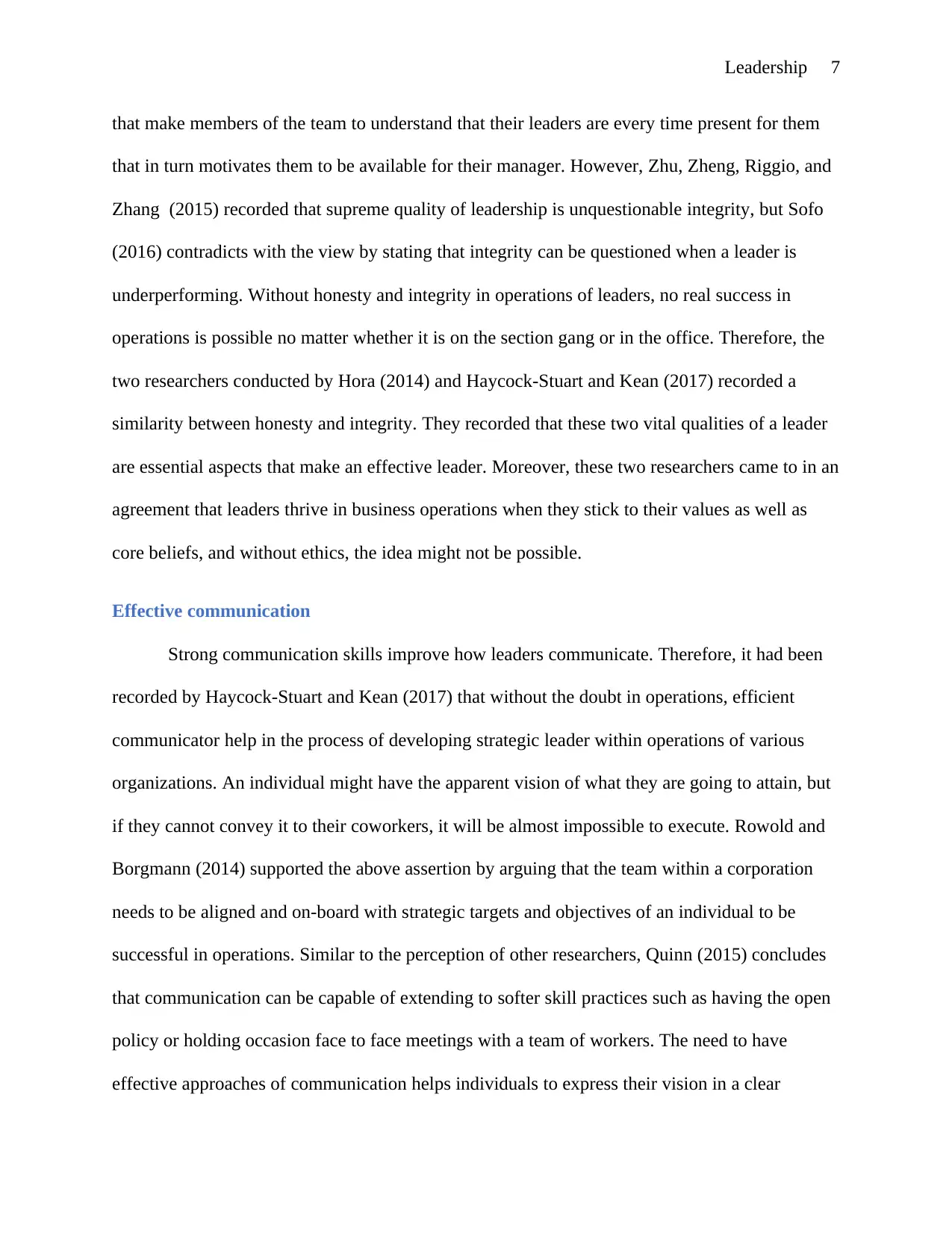
Leadership 7
that make members of the team to understand that their leaders are every time present for them
that in turn motivates them to be available for their manager. However, Zhu, Zheng, Riggio, and
Zhang (2015) recorded that supreme quality of leadership is unquestionable integrity, but Sofo
(2016) contradicts with the view by stating that integrity can be questioned when a leader is
underperforming. Without honesty and integrity in operations of leaders, no real success in
operations is possible no matter whether it is on the section gang or in the office. Therefore, the
two researchers conducted by Hora (2014) and Haycock-Stuart and Kean (2017) recorded a
similarity between honesty and integrity. They recorded that these two vital qualities of a leader
are essential aspects that make an effective leader. Moreover, these two researchers came to in an
agreement that leaders thrive in business operations when they stick to their values as well as
core beliefs, and without ethics, the idea might not be possible.
Effective communication
Strong communication skills improve how leaders communicate. Therefore, it had been
recorded by Haycock-Stuart and Kean (2017) that without the doubt in operations, efficient
communicator help in the process of developing strategic leader within operations of various
organizations. An individual might have the apparent vision of what they are going to attain, but
if they cannot convey it to their coworkers, it will be almost impossible to execute. Rowold and
Borgmann (2014) supported the above assertion by arguing that the team within a corporation
needs to be aligned and on-board with strategic targets and objectives of an individual to be
successful in operations. Similar to the perception of other researchers, Quinn (2015) concludes
that communication can be capable of extending to softer skill practices such as having the open
policy or holding occasion face to face meetings with a team of workers. The need to have
effective approaches of communication helps individuals to express their vision in a clear
that make members of the team to understand that their leaders are every time present for them
that in turn motivates them to be available for their manager. However, Zhu, Zheng, Riggio, and
Zhang (2015) recorded that supreme quality of leadership is unquestionable integrity, but Sofo
(2016) contradicts with the view by stating that integrity can be questioned when a leader is
underperforming. Without honesty and integrity in operations of leaders, no real success in
operations is possible no matter whether it is on the section gang or in the office. Therefore, the
two researchers conducted by Hora (2014) and Haycock-Stuart and Kean (2017) recorded a
similarity between honesty and integrity. They recorded that these two vital qualities of a leader
are essential aspects that make an effective leader. Moreover, these two researchers came to in an
agreement that leaders thrive in business operations when they stick to their values as well as
core beliefs, and without ethics, the idea might not be possible.
Effective communication
Strong communication skills improve how leaders communicate. Therefore, it had been
recorded by Haycock-Stuart and Kean (2017) that without the doubt in operations, efficient
communicator help in the process of developing strategic leader within operations of various
organizations. An individual might have the apparent vision of what they are going to attain, but
if they cannot convey it to their coworkers, it will be almost impossible to execute. Rowold and
Borgmann (2014) supported the above assertion by arguing that the team within a corporation
needs to be aligned and on-board with strategic targets and objectives of an individual to be
successful in operations. Similar to the perception of other researchers, Quinn (2015) concludes
that communication can be capable of extending to softer skill practices such as having the open
policy or holding occasion face to face meetings with a team of workers. The need to have
effective approaches of communication helps individuals to express their vision in a clear
Paraphrase This Document
Need a fresh take? Get an instant paraphrase of this document with our AI Paraphraser
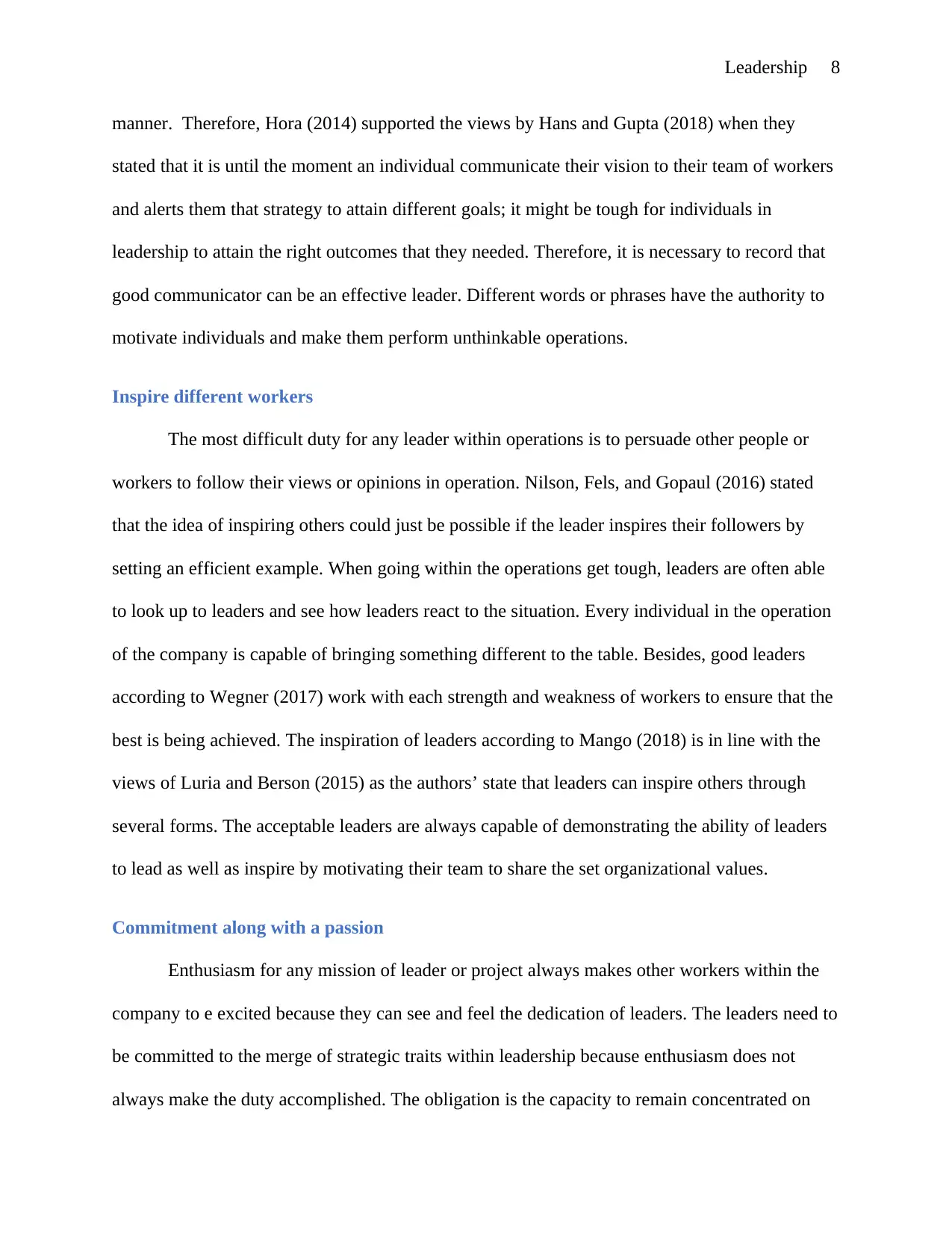
Leadership 8
manner. Therefore, Hora (2014) supported the views by Hans and Gupta (2018) when they
stated that it is until the moment an individual communicate their vision to their team of workers
and alerts them that strategy to attain different goals; it might be tough for individuals in
leadership to attain the right outcomes that they needed. Therefore, it is necessary to record that
good communicator can be an effective leader. Different words or phrases have the authority to
motivate individuals and make them perform unthinkable operations.
Inspire different workers
The most difficult duty for any leader within operations is to persuade other people or
workers to follow their views or opinions in operation. Nilson, Fels, and Gopaul (2016) stated
that the idea of inspiring others could just be possible if the leader inspires their followers by
setting an efficient example. When going within the operations get tough, leaders are often able
to look up to leaders and see how leaders react to the situation. Every individual in the operation
of the company is capable of bringing something different to the table. Besides, good leaders
according to Wegner (2017) work with each strength and weakness of workers to ensure that the
best is being achieved. The inspiration of leaders according to Mango (2018) is in line with the
views of Luria and Berson (2015) as the authors’ state that leaders can inspire others through
several forms. The acceptable leaders are always capable of demonstrating the ability of leaders
to lead as well as inspire by motivating their team to share the set organizational values.
Commitment along with a passion
Enthusiasm for any mission of leader or project always makes other workers within the
company to e excited because they can see and feel the dedication of leaders. The leaders need to
be committed to the merge of strategic traits within leadership because enthusiasm does not
always make the duty accomplished. The obligation is the capacity to remain concentrated on
manner. Therefore, Hora (2014) supported the views by Hans and Gupta (2018) when they
stated that it is until the moment an individual communicate their vision to their team of workers
and alerts them that strategy to attain different goals; it might be tough for individuals in
leadership to attain the right outcomes that they needed. Therefore, it is necessary to record that
good communicator can be an effective leader. Different words or phrases have the authority to
motivate individuals and make them perform unthinkable operations.
Inspire different workers
The most difficult duty for any leader within operations is to persuade other people or
workers to follow their views or opinions in operation. Nilson, Fels, and Gopaul (2016) stated
that the idea of inspiring others could just be possible if the leader inspires their followers by
setting an efficient example. When going within the operations get tough, leaders are often able
to look up to leaders and see how leaders react to the situation. Every individual in the operation
of the company is capable of bringing something different to the table. Besides, good leaders
according to Wegner (2017) work with each strength and weakness of workers to ensure that the
best is being achieved. The inspiration of leaders according to Mango (2018) is in line with the
views of Luria and Berson (2015) as the authors’ state that leaders can inspire others through
several forms. The acceptable leaders are always capable of demonstrating the ability of leaders
to lead as well as inspire by motivating their team to share the set organizational values.
Commitment along with a passion
Enthusiasm for any mission of leader or project always makes other workers within the
company to e excited because they can see and feel the dedication of leaders. The leaders need to
be committed to the merge of strategic traits within leadership because enthusiasm does not
always make the duty accomplished. The obligation is the capacity to remain concentrated on
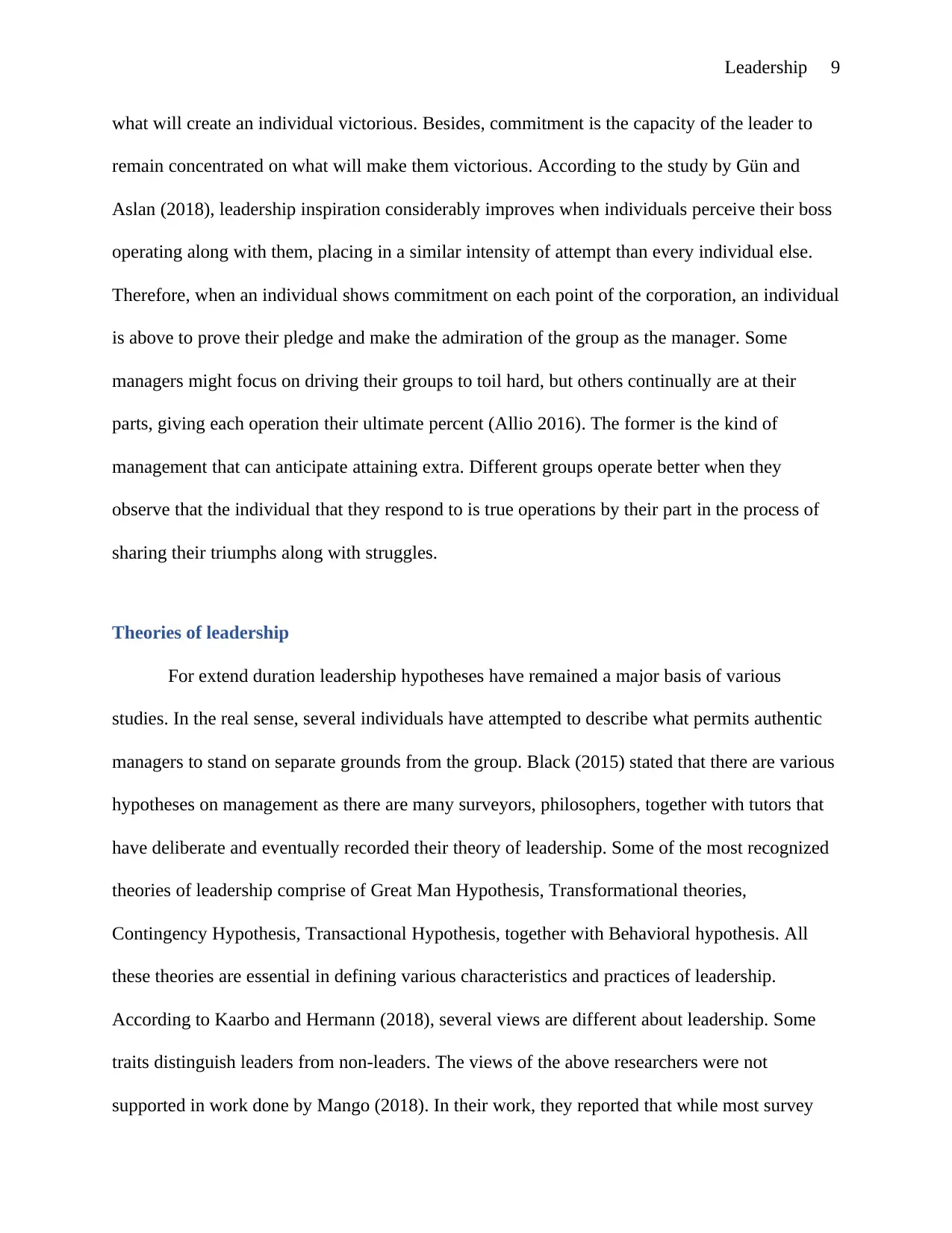
Leadership 9
what will create an individual victorious. Besides, commitment is the capacity of the leader to
remain concentrated on what will make them victorious. According to the study by Gün and
Aslan (2018), leadership inspiration considerably improves when individuals perceive their boss
operating along with them, placing in a similar intensity of attempt than every individual else.
Therefore, when an individual shows commitment on each point of the corporation, an individual
is above to prove their pledge and make the admiration of the group as the manager. Some
managers might focus on driving their groups to toil hard, but others continually are at their
parts, giving each operation their ultimate percent (Allio 2016). The former is the kind of
management that can anticipate attaining extra. Different groups operate better when they
observe that the individual that they respond to is true operations by their part in the process of
sharing their triumphs along with struggles.
Theories of leadership
For extend duration leadership hypotheses have remained a major basis of various
studies. In the real sense, several individuals have attempted to describe what permits authentic
managers to stand on separate grounds from the group. Black (2015) stated that there are various
hypotheses on management as there are many surveyors, philosophers, together with tutors that
have deliberate and eventually recorded their theory of leadership. Some of the most recognized
theories of leadership comprise of Great Man Hypothesis, Transformational theories,
Contingency Hypothesis, Transactional Hypothesis, together with Behavioral hypothesis. All
these theories are essential in defining various characteristics and practices of leadership.
According to Kaarbo and Hermann (2018), several views are different about leadership. Some
traits distinguish leaders from non-leaders. The views of the above researchers were not
supported in work done by Mango (2018). In their work, they reported that while most survey
what will create an individual victorious. Besides, commitment is the capacity of the leader to
remain concentrated on what will make them victorious. According to the study by Gün and
Aslan (2018), leadership inspiration considerably improves when individuals perceive their boss
operating along with them, placing in a similar intensity of attempt than every individual else.
Therefore, when an individual shows commitment on each point of the corporation, an individual
is above to prove their pledge and make the admiration of the group as the manager. Some
managers might focus on driving their groups to toil hard, but others continually are at their
parts, giving each operation their ultimate percent (Allio 2016). The former is the kind of
management that can anticipate attaining extra. Different groups operate better when they
observe that the individual that they respond to is true operations by their part in the process of
sharing their triumphs along with struggles.
Theories of leadership
For extend duration leadership hypotheses have remained a major basis of various
studies. In the real sense, several individuals have attempted to describe what permits authentic
managers to stand on separate grounds from the group. Black (2015) stated that there are various
hypotheses on management as there are many surveyors, philosophers, together with tutors that
have deliberate and eventually recorded their theory of leadership. Some of the most recognized
theories of leadership comprise of Great Man Hypothesis, Transformational theories,
Contingency Hypothesis, Transactional Hypothesis, together with Behavioral hypothesis. All
these theories are essential in defining various characteristics and practices of leadership.
According to Kaarbo and Hermann (2018), several views are different about leadership. Some
traits distinguish leaders from non-leaders. The views of the above researchers were not
supported in work done by Mango (2018). In their work, they reported that while most survey
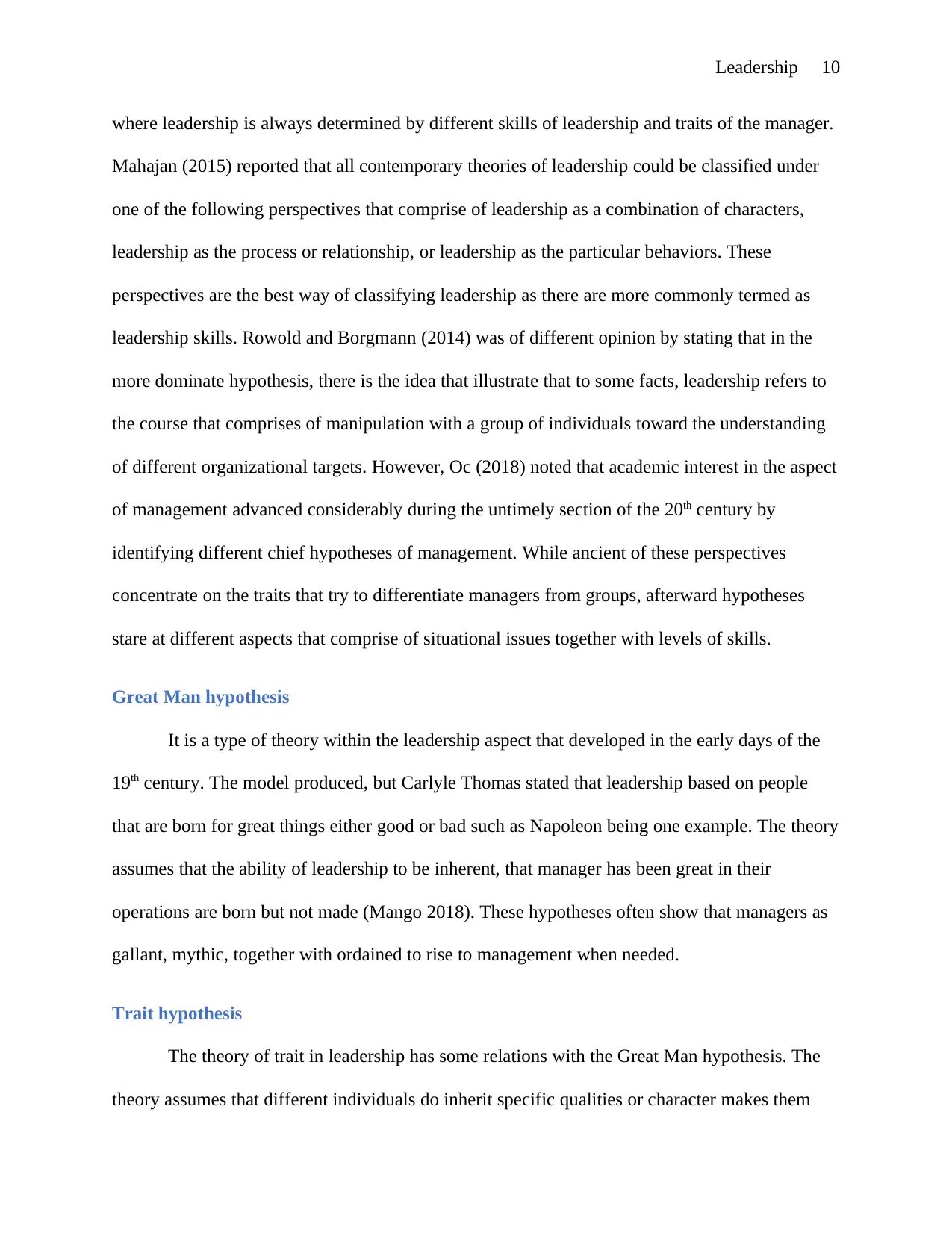
Leadership 10
where leadership is always determined by different skills of leadership and traits of the manager.
Mahajan (2015) reported that all contemporary theories of leadership could be classified under
one of the following perspectives that comprise of leadership as a combination of characters,
leadership as the process or relationship, or leadership as the particular behaviors. These
perspectives are the best way of classifying leadership as there are more commonly termed as
leadership skills. Rowold and Borgmann (2014) was of different opinion by stating that in the
more dominate hypothesis, there is the idea that illustrate that to some facts, leadership refers to
the course that comprises of manipulation with a group of individuals toward the understanding
of different organizational targets. However, Oc (2018) noted that academic interest in the aspect
of management advanced considerably during the untimely section of the 20th century by
identifying different chief hypotheses of management. While ancient of these perspectives
concentrate on the traits that try to differentiate managers from groups, afterward hypotheses
stare at different aspects that comprise of situational issues together with levels of skills.
Great Man hypothesis
It is a type of theory within the leadership aspect that developed in the early days of the
19th century. The model produced, but Carlyle Thomas stated that leadership based on people
that are born for great things either good or bad such as Napoleon being one example. The theory
assumes that the ability of leadership to be inherent, that manager has been great in their
operations are born but not made (Mango 2018). These hypotheses often show that managers as
gallant, mythic, together with ordained to rise to management when needed.
Trait hypothesis
The theory of trait in leadership has some relations with the Great Man hypothesis. The
theory assumes that different individuals do inherit specific qualities or character makes them
where leadership is always determined by different skills of leadership and traits of the manager.
Mahajan (2015) reported that all contemporary theories of leadership could be classified under
one of the following perspectives that comprise of leadership as a combination of characters,
leadership as the process or relationship, or leadership as the particular behaviors. These
perspectives are the best way of classifying leadership as there are more commonly termed as
leadership skills. Rowold and Borgmann (2014) was of different opinion by stating that in the
more dominate hypothesis, there is the idea that illustrate that to some facts, leadership refers to
the course that comprises of manipulation with a group of individuals toward the understanding
of different organizational targets. However, Oc (2018) noted that academic interest in the aspect
of management advanced considerably during the untimely section of the 20th century by
identifying different chief hypotheses of management. While ancient of these perspectives
concentrate on the traits that try to differentiate managers from groups, afterward hypotheses
stare at different aspects that comprise of situational issues together with levels of skills.
Great Man hypothesis
It is a type of theory within the leadership aspect that developed in the early days of the
19th century. The model produced, but Carlyle Thomas stated that leadership based on people
that are born for great things either good or bad such as Napoleon being one example. The theory
assumes that the ability of leadership to be inherent, that manager has been great in their
operations are born but not made (Mango 2018). These hypotheses often show that managers as
gallant, mythic, together with ordained to rise to management when needed.
Trait hypothesis
The theory of trait in leadership has some relations with the Great Man hypothesis. The
theory assumes that different individuals do inherit specific qualities or character makes them
Secure Best Marks with AI Grader
Need help grading? Try our AI Grader for instant feedback on your assignments.
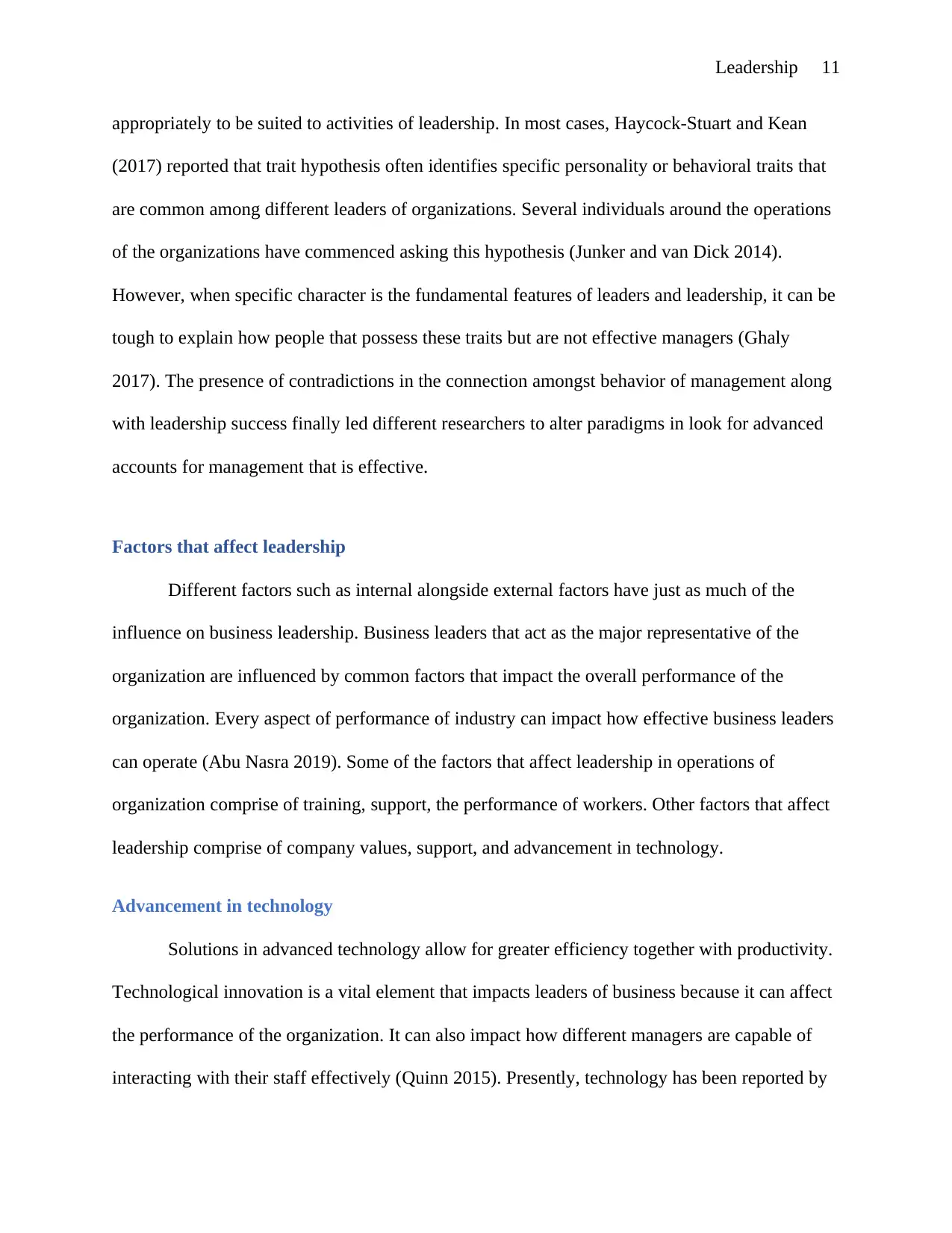
Leadership 11
appropriately to be suited to activities of leadership. In most cases, Haycock-Stuart and Kean
(2017) reported that trait hypothesis often identifies specific personality or behavioral traits that
are common among different leaders of organizations. Several individuals around the operations
of the organizations have commenced asking this hypothesis (Junker and van Dick 2014).
However, when specific character is the fundamental features of leaders and leadership, it can be
tough to explain how people that possess these traits but are not effective managers (Ghaly
2017). The presence of contradictions in the connection amongst behavior of management along
with leadership success finally led different researchers to alter paradigms in look for advanced
accounts for management that is effective.
Factors that affect leadership
Different factors such as internal alongside external factors have just as much of the
influence on business leadership. Business leaders that act as the major representative of the
organization are influenced by common factors that impact the overall performance of the
organization. Every aspect of performance of industry can impact how effective business leaders
can operate (Abu Nasra 2019). Some of the factors that affect leadership in operations of
organization comprise of training, support, the performance of workers. Other factors that affect
leadership comprise of company values, support, and advancement in technology.
Advancement in technology
Solutions in advanced technology allow for greater efficiency together with productivity.
Technological innovation is a vital element that impacts leaders of business because it can affect
the performance of the organization. It can also impact how different managers are capable of
interacting with their staff effectively (Quinn 2015). Presently, technology has been reported by
appropriately to be suited to activities of leadership. In most cases, Haycock-Stuart and Kean
(2017) reported that trait hypothesis often identifies specific personality or behavioral traits that
are common among different leaders of organizations. Several individuals around the operations
of the organizations have commenced asking this hypothesis (Junker and van Dick 2014).
However, when specific character is the fundamental features of leaders and leadership, it can be
tough to explain how people that possess these traits but are not effective managers (Ghaly
2017). The presence of contradictions in the connection amongst behavior of management along
with leadership success finally led different researchers to alter paradigms in look for advanced
accounts for management that is effective.
Factors that affect leadership
Different factors such as internal alongside external factors have just as much of the
influence on business leadership. Business leaders that act as the major representative of the
organization are influenced by common factors that impact the overall performance of the
organization. Every aspect of performance of industry can impact how effective business leaders
can operate (Abu Nasra 2019). Some of the factors that affect leadership in operations of
organization comprise of training, support, the performance of workers. Other factors that affect
leadership comprise of company values, support, and advancement in technology.
Advancement in technology
Solutions in advanced technology allow for greater efficiency together with productivity.
Technological innovation is a vital element that impacts leaders of business because it can affect
the performance of the organization. It can also impact how different managers are capable of
interacting with their staff effectively (Quinn 2015). Presently, technology has been reported by
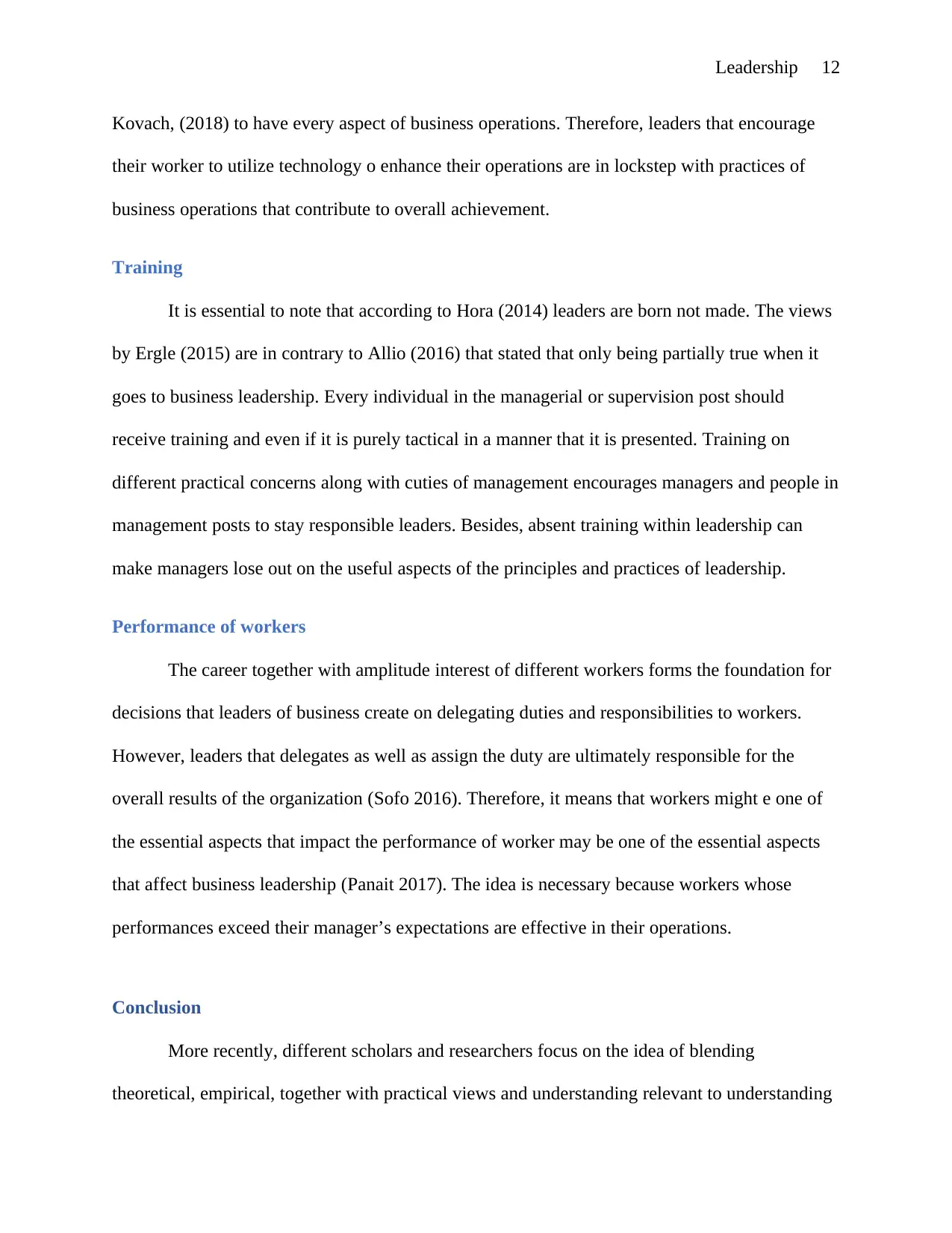
Leadership 12
Kovach, (2018) to have every aspect of business operations. Therefore, leaders that encourage
their worker to utilize technology o enhance their operations are in lockstep with practices of
business operations that contribute to overall achievement.
Training
It is essential to note that according to Hora (2014) leaders are born not made. The views
by Ergle (2015) are in contrary to Allio (2016) that stated that only being partially true when it
goes to business leadership. Every individual in the managerial or supervision post should
receive training and even if it is purely tactical in a manner that it is presented. Training on
different practical concerns along with cuties of management encourages managers and people in
management posts to stay responsible leaders. Besides, absent training within leadership can
make managers lose out on the useful aspects of the principles and practices of leadership.
Performance of workers
The career together with amplitude interest of different workers forms the foundation for
decisions that leaders of business create on delegating duties and responsibilities to workers.
However, leaders that delegates as well as assign the duty are ultimately responsible for the
overall results of the organization (Sofo 2016). Therefore, it means that workers might e one of
the essential aspects that impact the performance of worker may be one of the essential aspects
that affect business leadership (Panait 2017). The idea is necessary because workers whose
performances exceed their manager’s expectations are effective in their operations.
Conclusion
More recently, different scholars and researchers focus on the idea of blending
theoretical, empirical, together with practical views and understanding relevant to understanding
Kovach, (2018) to have every aspect of business operations. Therefore, leaders that encourage
their worker to utilize technology o enhance their operations are in lockstep with practices of
business operations that contribute to overall achievement.
Training
It is essential to note that according to Hora (2014) leaders are born not made. The views
by Ergle (2015) are in contrary to Allio (2016) that stated that only being partially true when it
goes to business leadership. Every individual in the managerial or supervision post should
receive training and even if it is purely tactical in a manner that it is presented. Training on
different practical concerns along with cuties of management encourages managers and people in
management posts to stay responsible leaders. Besides, absent training within leadership can
make managers lose out on the useful aspects of the principles and practices of leadership.
Performance of workers
The career together with amplitude interest of different workers forms the foundation for
decisions that leaders of business create on delegating duties and responsibilities to workers.
However, leaders that delegates as well as assign the duty are ultimately responsible for the
overall results of the organization (Sofo 2016). Therefore, it means that workers might e one of
the essential aspects that impact the performance of worker may be one of the essential aspects
that affect business leadership (Panait 2017). The idea is necessary because workers whose
performances exceed their manager’s expectations are effective in their operations.
Conclusion
More recently, different scholars and researchers focus on the idea of blending
theoretical, empirical, together with practical views and understanding relevant to understanding
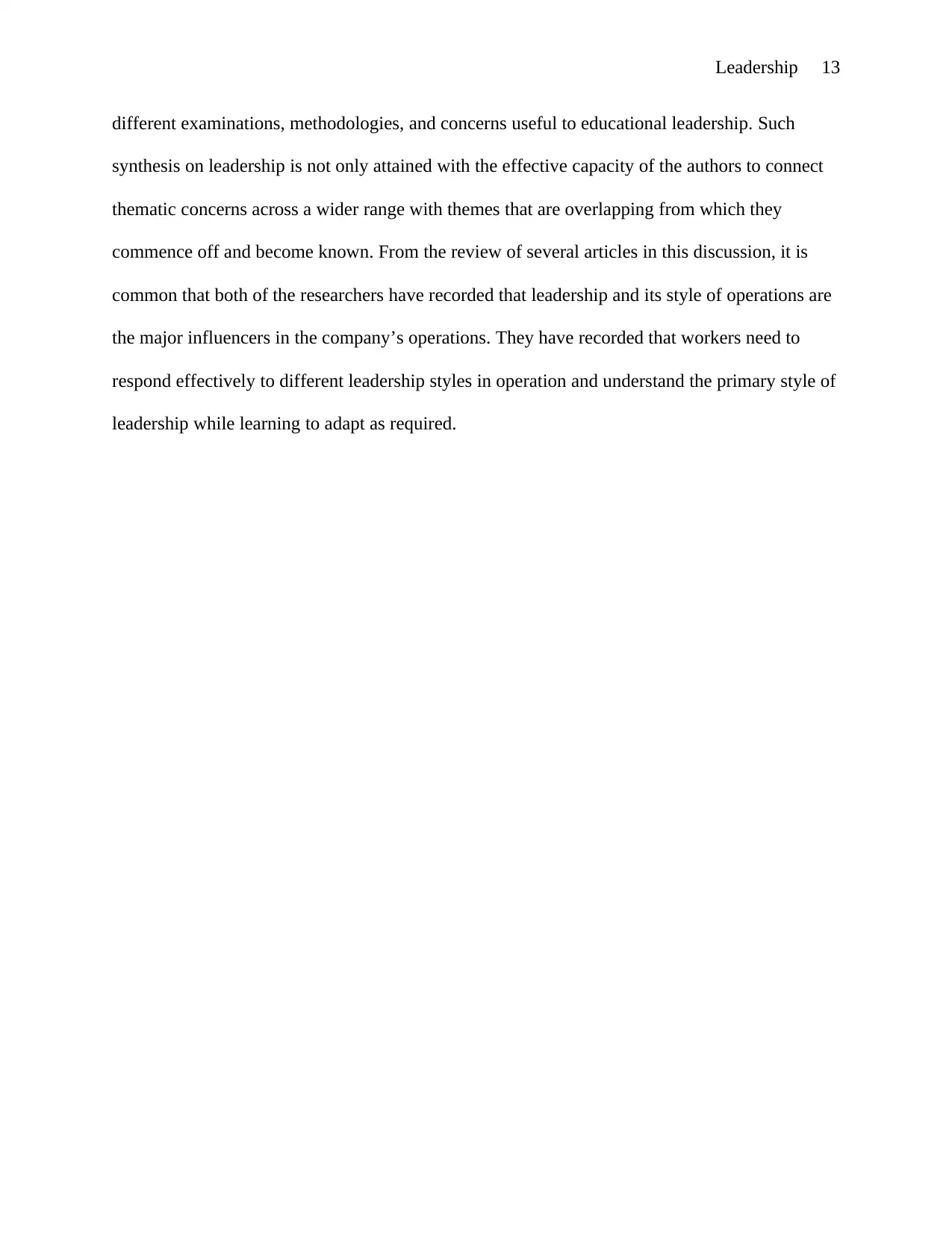
Leadership 13
different examinations, methodologies, and concerns useful to educational leadership. Such
synthesis on leadership is not only attained with the effective capacity of the authors to connect
thematic concerns across a wider range with themes that are overlapping from which they
commence off and become known. From the review of several articles in this discussion, it is
common that both of the researchers have recorded that leadership and its style of operations are
the major influencers in the company’s operations. They have recorded that workers need to
respond effectively to different leadership styles in operation and understand the primary style of
leadership while learning to adapt as required.
different examinations, methodologies, and concerns useful to educational leadership. Such
synthesis on leadership is not only attained with the effective capacity of the authors to connect
thematic concerns across a wider range with themes that are overlapping from which they
commence off and become known. From the review of several articles in this discussion, it is
common that both of the researchers have recorded that leadership and its style of operations are
the major influencers in the company’s operations. They have recorded that workers need to
respond effectively to different leadership styles in operation and understand the primary style of
leadership while learning to adapt as required.
Paraphrase This Document
Need a fresh take? Get an instant paraphrase of this document with our AI Paraphraser
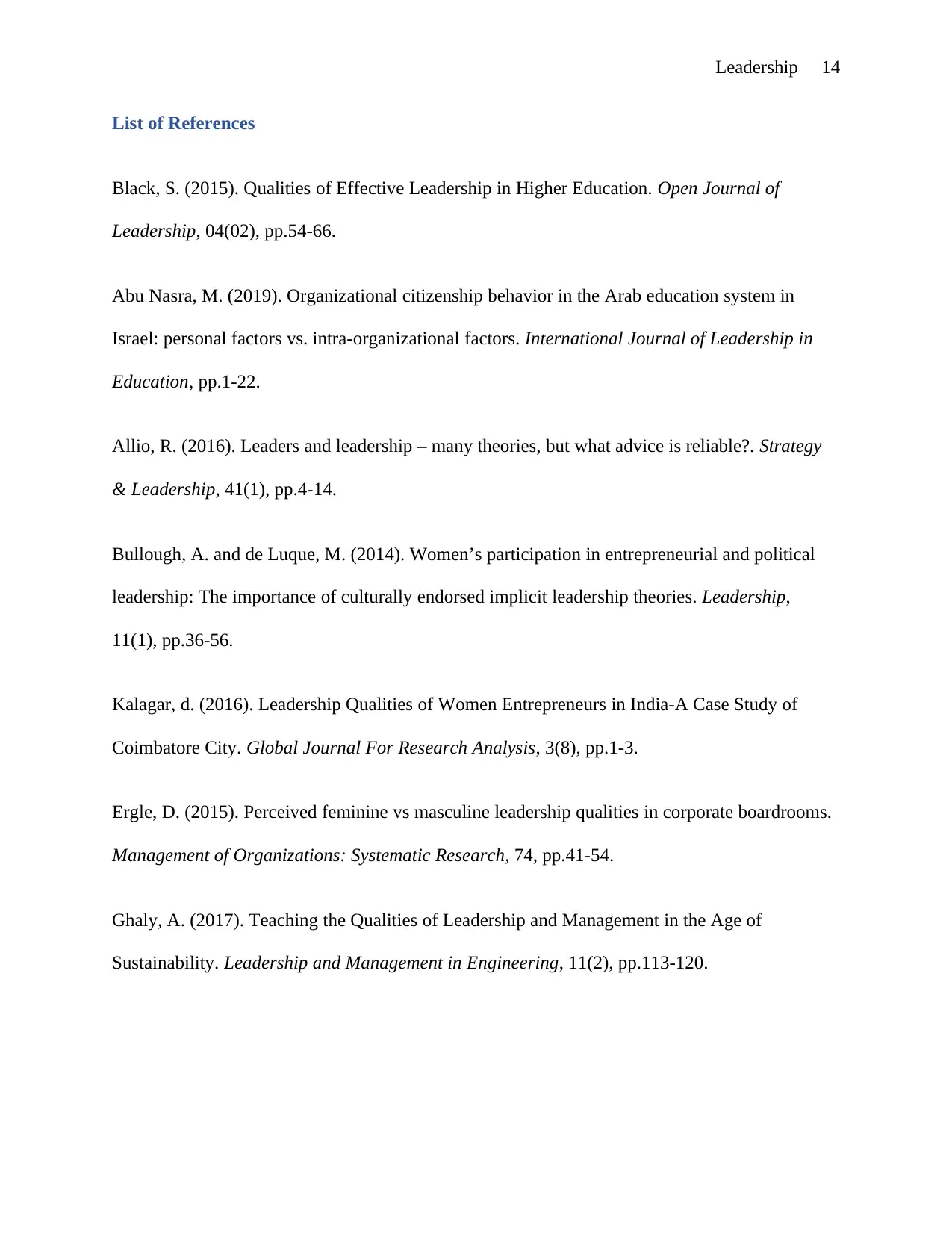
Leadership 14
List of References
Black, S. (2015). Qualities of Effective Leadership in Higher Education. Open Journal of
Leadership, 04(02), pp.54-66.
Abu Nasra, M. (2019). Organizational citizenship behavior in the Arab education system in
Israel: personal factors vs. intra-organizational factors. International Journal of Leadership in
Education, pp.1-22.
Allio, R. (2016). Leaders and leadership – many theories, but what advice is reliable?. Strategy
& Leadership, 41(1), pp.4-14.
Bullough, A. and de Luque, M. (2014). Women’s participation in entrepreneurial and political
leadership: The importance of culturally endorsed implicit leadership theories. Leadership,
11(1), pp.36-56.
Kalagar, d. (2016). Leadership Qualities of Women Entrepreneurs in India-A Case Study of
Coimbatore City. Global Journal For Research Analysis, 3(8), pp.1-3.
Ergle, D. (2015). Perceived feminine vs masculine leadership qualities in corporate boardrooms.
Management of Organizations: Systematic Research, 74, pp.41-54.
Ghaly, A. (2017). Teaching the Qualities of Leadership and Management in the Age of
Sustainability. Leadership and Management in Engineering, 11(2), pp.113-120.
List of References
Black, S. (2015). Qualities of Effective Leadership in Higher Education. Open Journal of
Leadership, 04(02), pp.54-66.
Abu Nasra, M. (2019). Organizational citizenship behavior in the Arab education system in
Israel: personal factors vs. intra-organizational factors. International Journal of Leadership in
Education, pp.1-22.
Allio, R. (2016). Leaders and leadership – many theories, but what advice is reliable?. Strategy
& Leadership, 41(1), pp.4-14.
Bullough, A. and de Luque, M. (2014). Women’s participation in entrepreneurial and political
leadership: The importance of culturally endorsed implicit leadership theories. Leadership,
11(1), pp.36-56.
Kalagar, d. (2016). Leadership Qualities of Women Entrepreneurs in India-A Case Study of
Coimbatore City. Global Journal For Research Analysis, 3(8), pp.1-3.
Ergle, D. (2015). Perceived feminine vs masculine leadership qualities in corporate boardrooms.
Management of Organizations: Systematic Research, 74, pp.41-54.
Ghaly, A. (2017). Teaching the Qualities of Leadership and Management in the Age of
Sustainability. Leadership and Management in Engineering, 11(2), pp.113-120.
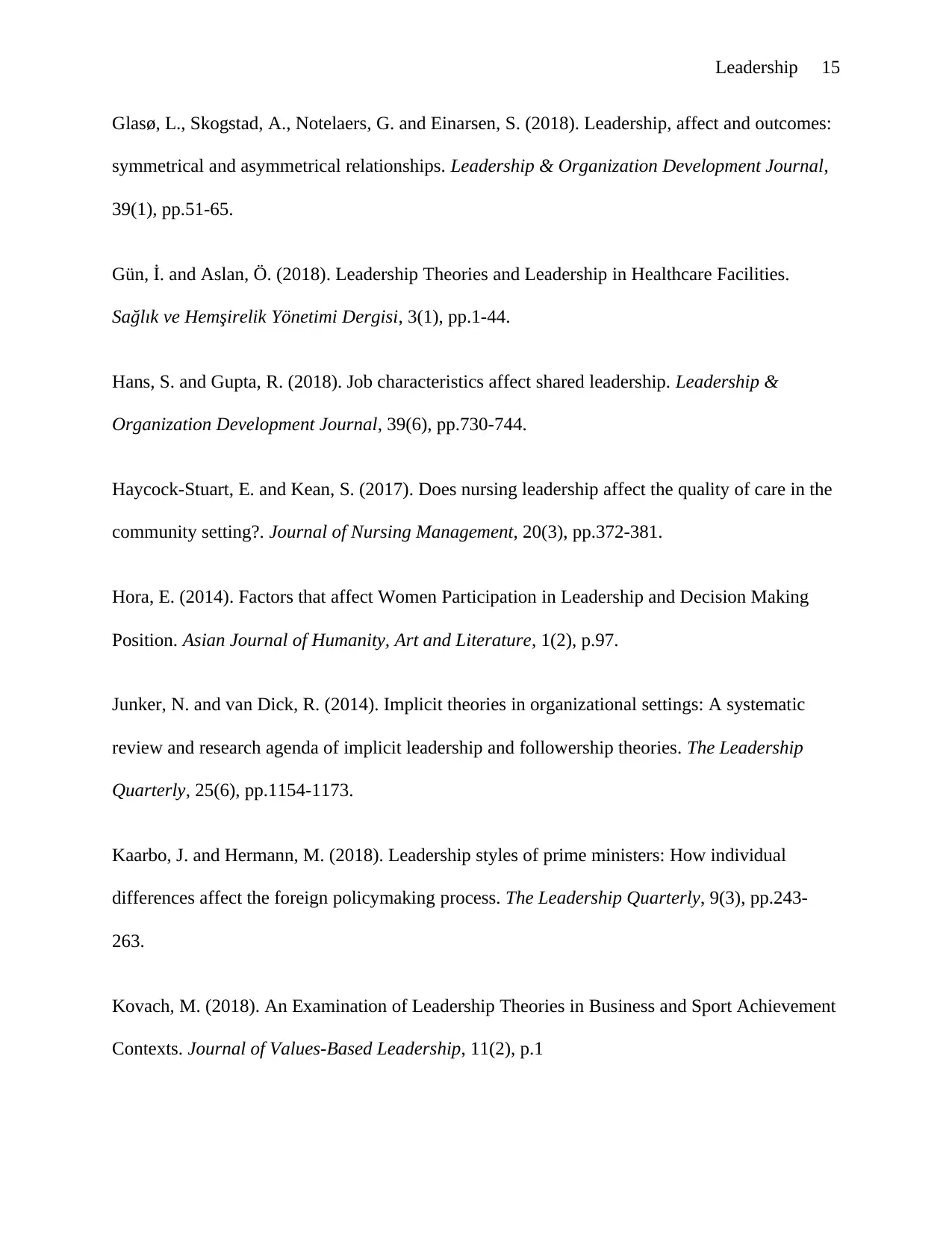
Leadership 15
Glasø, L., Skogstad, A., Notelaers, G. and Einarsen, S. (2018). Leadership, affect and outcomes:
symmetrical and asymmetrical relationships. Leadership & Organization Development Journal,
39(1), pp.51-65.
Gün, İ. and Aslan, Ö. (2018). Leadership Theories and Leadership in Healthcare Facilities.
Sağlık ve Hemşirelik Yönetimi Dergisi, 3(1), pp.1-44.
Hans, S. and Gupta, R. (2018). Job characteristics affect shared leadership. Leadership &
Organization Development Journal, 39(6), pp.730-744.
Haycock-Stuart, E. and Kean, S. (2017). Does nursing leadership affect the quality of care in the
community setting?. Journal of Nursing Management, 20(3), pp.372-381.
Hora, E. (2014). Factors that affect Women Participation in Leadership and Decision Making
Position. Asian Journal of Humanity, Art and Literature, 1(2), p.97.
Junker, N. and van Dick, R. (2014). Implicit theories in organizational settings: A systematic
review and research agenda of implicit leadership and followership theories. The Leadership
Quarterly, 25(6), pp.1154-1173.
Kaarbo, J. and Hermann, M. (2018). Leadership styles of prime ministers: How individual
differences affect the foreign policymaking process. The Leadership Quarterly, 9(3), pp.243-
263.
Kovach, M. (2018). An Examination of Leadership Theories in Business and Sport Achievement
Contexts. Journal of Values-Based Leadership, 11(2), p.1
Glasø, L., Skogstad, A., Notelaers, G. and Einarsen, S. (2018). Leadership, affect and outcomes:
symmetrical and asymmetrical relationships. Leadership & Organization Development Journal,
39(1), pp.51-65.
Gün, İ. and Aslan, Ö. (2018). Leadership Theories and Leadership in Healthcare Facilities.
Sağlık ve Hemşirelik Yönetimi Dergisi, 3(1), pp.1-44.
Hans, S. and Gupta, R. (2018). Job characteristics affect shared leadership. Leadership &
Organization Development Journal, 39(6), pp.730-744.
Haycock-Stuart, E. and Kean, S. (2017). Does nursing leadership affect the quality of care in the
community setting?. Journal of Nursing Management, 20(3), pp.372-381.
Hora, E. (2014). Factors that affect Women Participation in Leadership and Decision Making
Position. Asian Journal of Humanity, Art and Literature, 1(2), p.97.
Junker, N. and van Dick, R. (2014). Implicit theories in organizational settings: A systematic
review and research agenda of implicit leadership and followership theories. The Leadership
Quarterly, 25(6), pp.1154-1173.
Kaarbo, J. and Hermann, M. (2018). Leadership styles of prime ministers: How individual
differences affect the foreign policymaking process. The Leadership Quarterly, 9(3), pp.243-
263.
Kovach, M. (2018). An Examination of Leadership Theories in Business and Sport Achievement
Contexts. Journal of Values-Based Leadership, 11(2), p.1
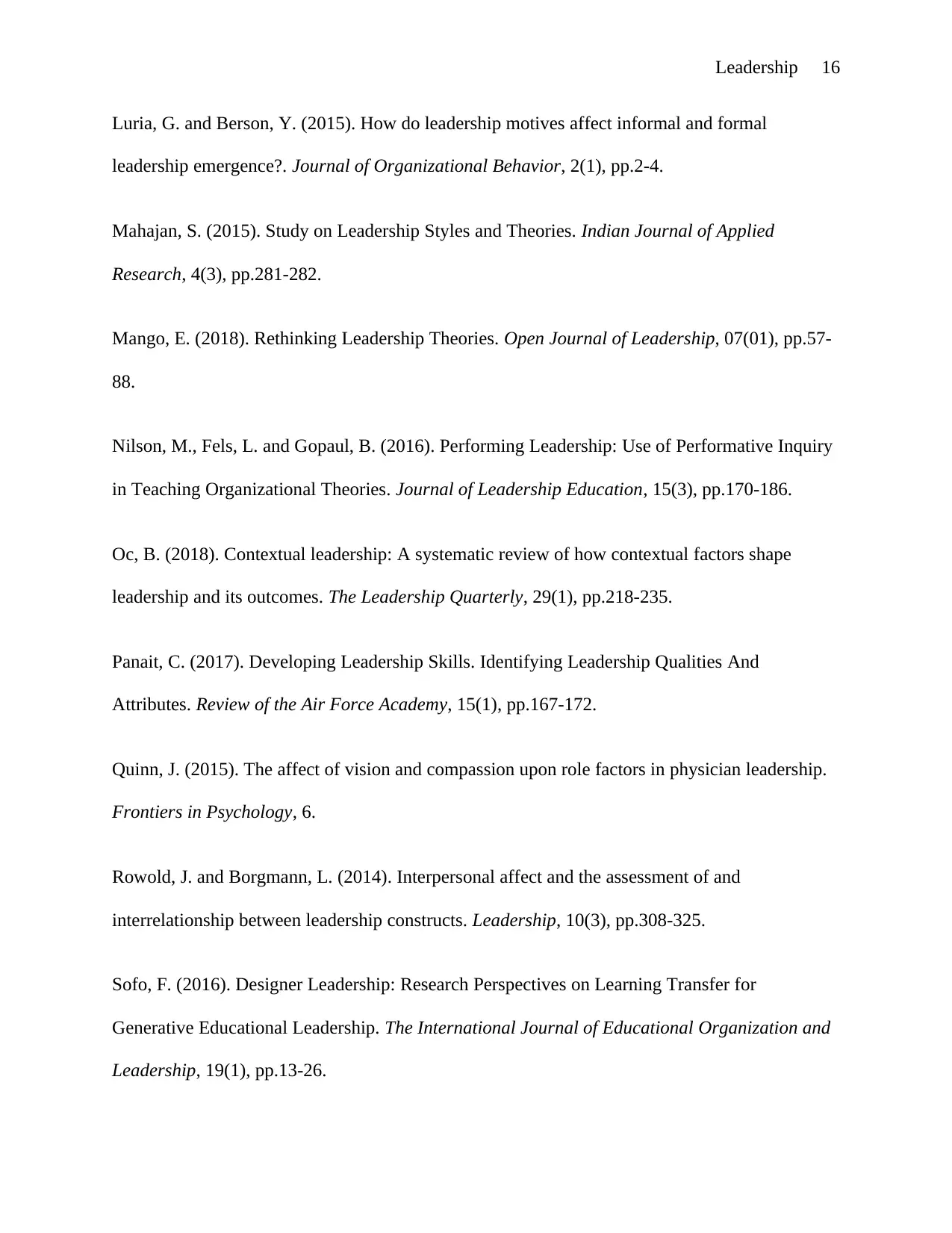
Leadership 16
Luria, G. and Berson, Y. (2015). How do leadership motives affect informal and formal
leadership emergence?. Journal of Organizational Behavior, 2(1), pp.2-4.
Mahajan, S. (2015). Study on Leadership Styles and Theories. Indian Journal of Applied
Research, 4(3), pp.281-282.
Mango, E. (2018). Rethinking Leadership Theories. Open Journal of Leadership, 07(01), pp.57-
88.
Nilson, M., Fels, L. and Gopaul, B. (2016). Performing Leadership: Use of Performative Inquiry
in Teaching Organizational Theories. Journal of Leadership Education, 15(3), pp.170-186.
Oc, B. (2018). Contextual leadership: A systematic review of how contextual factors shape
leadership and its outcomes. The Leadership Quarterly, 29(1), pp.218-235.
Panait, C. (2017). Developing Leadership Skills. Identifying Leadership Qualities And
Attributes. Review of the Air Force Academy, 15(1), pp.167-172.
Quinn, J. (2015). The affect of vision and compassion upon role factors in physician leadership.
Frontiers in Psychology, 6.
Rowold, J. and Borgmann, L. (2014). Interpersonal affect and the assessment of and
interrelationship between leadership constructs. Leadership, 10(3), pp.308-325.
Sofo, F. (2016). Designer Leadership: Research Perspectives on Learning Transfer for
Generative Educational Leadership. The International Journal of Educational Organization and
Leadership, 19(1), pp.13-26.
Luria, G. and Berson, Y. (2015). How do leadership motives affect informal and formal
leadership emergence?. Journal of Organizational Behavior, 2(1), pp.2-4.
Mahajan, S. (2015). Study on Leadership Styles and Theories. Indian Journal of Applied
Research, 4(3), pp.281-282.
Mango, E. (2018). Rethinking Leadership Theories. Open Journal of Leadership, 07(01), pp.57-
88.
Nilson, M., Fels, L. and Gopaul, B. (2016). Performing Leadership: Use of Performative Inquiry
in Teaching Organizational Theories. Journal of Leadership Education, 15(3), pp.170-186.
Oc, B. (2018). Contextual leadership: A systematic review of how contextual factors shape
leadership and its outcomes. The Leadership Quarterly, 29(1), pp.218-235.
Panait, C. (2017). Developing Leadership Skills. Identifying Leadership Qualities And
Attributes. Review of the Air Force Academy, 15(1), pp.167-172.
Quinn, J. (2015). The affect of vision and compassion upon role factors in physician leadership.
Frontiers in Psychology, 6.
Rowold, J. and Borgmann, L. (2014). Interpersonal affect and the assessment of and
interrelationship between leadership constructs. Leadership, 10(3), pp.308-325.
Sofo, F. (2016). Designer Leadership: Research Perspectives on Learning Transfer for
Generative Educational Leadership. The International Journal of Educational Organization and
Leadership, 19(1), pp.13-26.
Secure Best Marks with AI Grader
Need help grading? Try our AI Grader for instant feedback on your assignments.
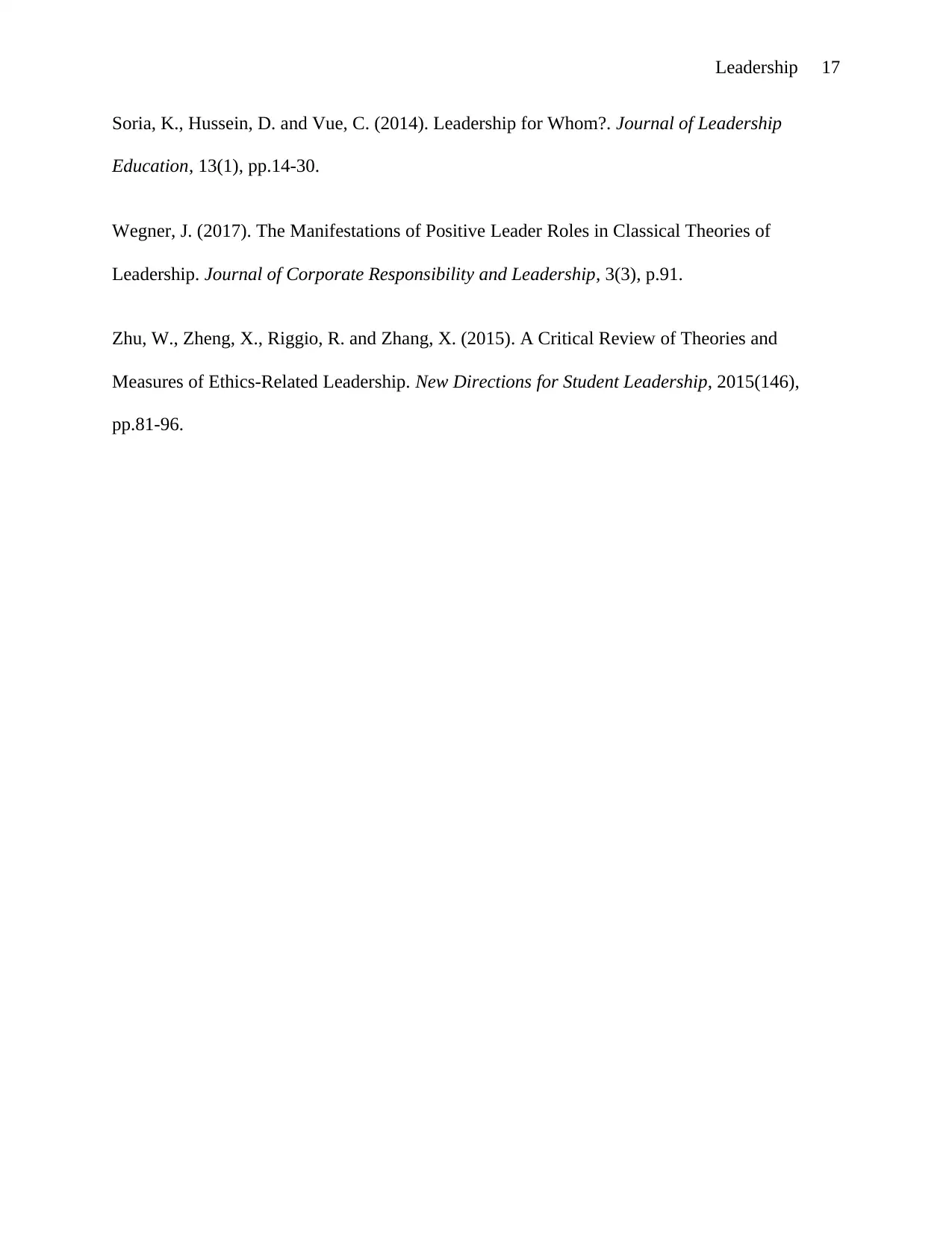
Leadership 17
Soria, K., Hussein, D. and Vue, C. (2014). Leadership for Whom?. Journal of Leadership
Education, 13(1), pp.14-30.
Wegner, J. (2017). The Manifestations of Positive Leader Roles in Classical Theories of
Leadership. Journal of Corporate Responsibility and Leadership, 3(3), p.91.
Zhu, W., Zheng, X., Riggio, R. and Zhang, X. (2015). A Critical Review of Theories and
Measures of Ethics-Related Leadership. New Directions for Student Leadership, 2015(146),
pp.81-96.
Soria, K., Hussein, D. and Vue, C. (2014). Leadership for Whom?. Journal of Leadership
Education, 13(1), pp.14-30.
Wegner, J. (2017). The Manifestations of Positive Leader Roles in Classical Theories of
Leadership. Journal of Corporate Responsibility and Leadership, 3(3), p.91.
Zhu, W., Zheng, X., Riggio, R. and Zhang, X. (2015). A Critical Review of Theories and
Measures of Ethics-Related Leadership. New Directions for Student Leadership, 2015(146),
pp.81-96.
1 out of 17
Related Documents
Your All-in-One AI-Powered Toolkit for Academic Success.
+13062052269
info@desklib.com
Available 24*7 on WhatsApp / Email
![[object Object]](/_next/static/media/star-bottom.7253800d.svg)
Unlock your academic potential
© 2024 | Zucol Services PVT LTD | All rights reserved.





